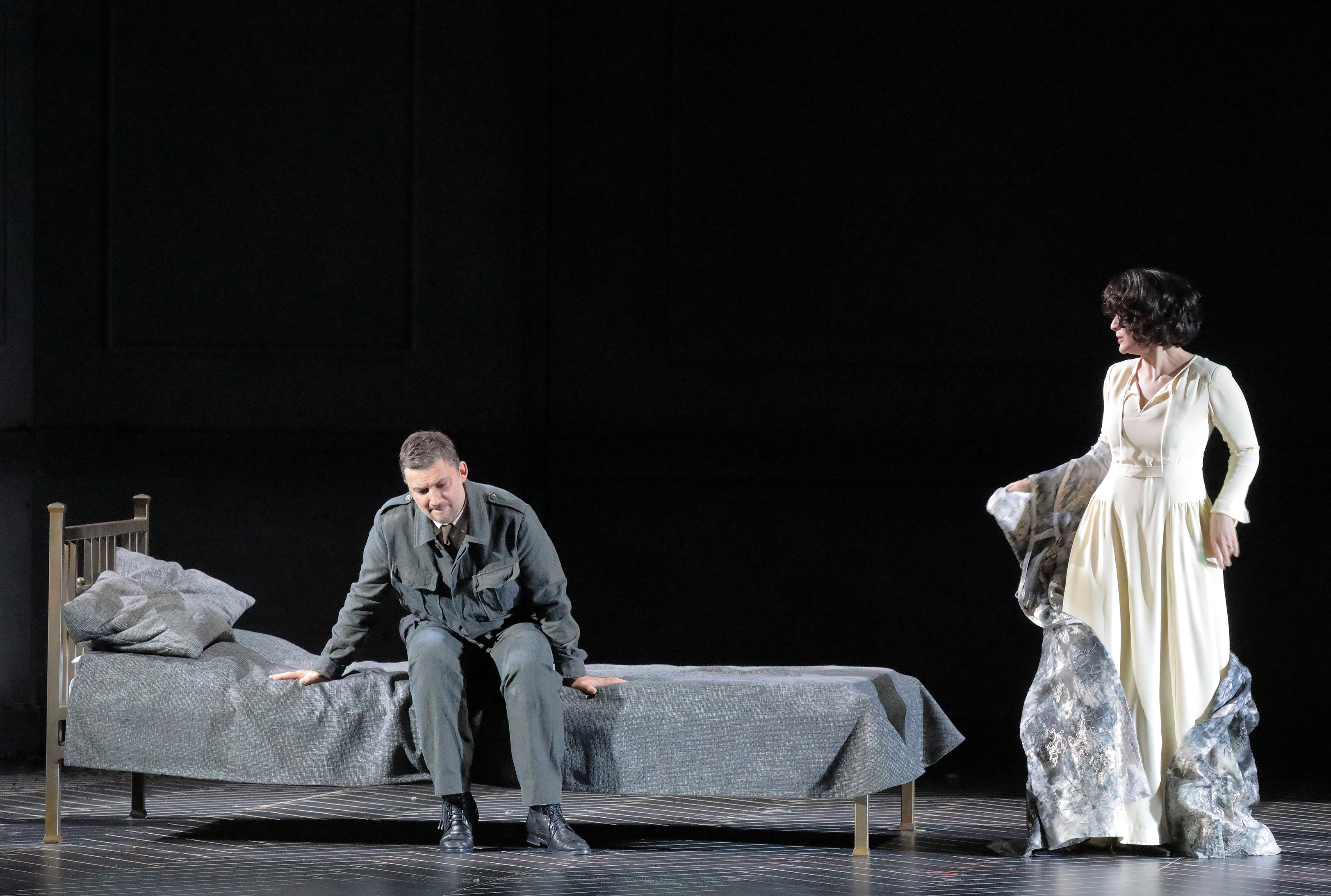
Can great singing justify the whole opera production?
This season director Amélie Niermeyer presented a new production of Verdi’s masterpiece “Otello” at the Bayerische Staatsoper.
In this controversial production any heroic as well as historical context was removed. Instead of a story of an exhausted hero, broken under the pressure of doubts and jealousy, we received a story of a weak man full of anger and with no power to control it, being manipulated by just another bad man.
Otello was thus a mad tyrant and somehow his beautiful and smart victim, Desdemona, who feels danger from the very beginning, never really tries to resist.
And that was absolutely unconvincing.
“The character I really feel sorry for is the victim — Desdemona,” — Niermeyer said. I wonder, why having all the instruments to highlight any shade of Desdemona’s personality, the director decided to show this proud, true, and noble woman as just a victim, deserving pity?
Perhaps, Niermeyer tried to bust the problem, depriving it of “unnecessary details.” Details like a social context and love itself. And what was shown was just darkness with no shades.
Instead of blackface the director turned the whole opera into black.
The Heroine
Niermeyer tried so hard to impose of this idea as Desdemona as the opera’s grand heroine. We don’t see the people of Cyprus anxiously awaiting the arrival of the new governor in the first scene but only witness Desdemona, almost fainting while waiting for her husband in her room. There was also a scene with flaming sleeves, which I still have doubts about how to interpret. But none of that made her a hero.
Fortunately, Anja Harteros managed to do it herself.
Harteros triumphed in the show and one could say she was the standout of the evening. She has a rich lirico-spinto soprano, which is under her total control. Her tone is effortlessly focused and during the performance she moved fluently from forte to piano and from high A to the very bottom of the tessitura. Her voice displays power, agility and brightness, which she uses with a high degree of skill.
Trying to cool down her husband at the end of Act one, she showed nobility using the beauty of her timbre. Unfortunately the scene itself was rather strange with Otello trying to distance himself from Desdemona, literally running away from her.
Playing with fire in “D’un uom che geme sotto il tuo disdegno la preghiera ti porto” in Act two, she showed real strength in her voice, trying to balance it with a hint of vulnerability, facing her husband’s anger.
Her “Quella parola orrenda” in the Act three duet was delivered with a dreadful and paralyzing sound and the lightest or highest sound she delivered was so clean and bright that you could hear it against the backdrop of a roaring orchestra at different junctures of the opera.
In Act four she brought great acting and wonderful lyricism. Her “Willow song” was haunting and towards the climax her voice exploded in agony, particularly as she sung “Emilia Addio.” Her high A sharp made the room flinch. And then her voice started to die down as she sang the “Ave Maria.” As she phrased her final “Amen” there was a sense of acceptance to her unfortunate fate. She was so silent and gentle, that minutes later it was so hard to believe, she would try to somehow protect her life.
It’s Own Little drama
Jonas Kaufmann had a solid performance throughout the evening, keeping to the score’s ever-shifting vocal dynamics. During his “Esulate” he delivered a strong and effortless A natural at the apex of the passage; it must be noted that the moment was spoiled a bit as he appeared in a bedroom and his only spectator was his wife. But his second entrance, “Abbasso le spade,” fortunately reaffirmed his authority to the people.
The relationship between Kaufmann and Gerald Finley was excellent as they matched each other quite well vocally and acting wise. During every duet with Finley, Kaufmann showed perfect control of tone, keeping it smooth but eventually exploding in climactic moments. Many could argue that Jago was the scene stealer with his presence and scheming villainy but in the case of their extended scenes, the tenor was a force to be reckoned with vocally.
Kaufmann also excelled in the Act three duet with Desdemona, showing a full-throated spinto that was able to modulate in numerous ways required by the demanding scene. He began with an almost gentle tone, that matched the opening duet. But then the phrasing took on a staccato quality, and he went through confidence, hysteria, calmness, tenderness, contempt, and raw aggression in just a few lines.
His “Dio mi potevi” was delivered with the finest pianissimo and a pure tone, then his madness exposed his weakness, and he threw himself to the floor where he lost an ability to produce any more sound.
Kaufmann also did not miss an opportunity to highlight the brutality and violence in Act four. There was a sense of realism as he shouted and charged at Desdemona.
Kaufmann’s magnificent interpretation reached a climax in the “Niun mi tema,” a truly wrenching showcase that made Niermeyer’s attempt at “No pity for Otello” null and void in this instance. The tenor delivered such passionate singing that was filled with love and tenderness that the director’s vision got lost. Kaufmann’s details, particularly at the ending only enhanced the heartbreak of the character. With the physical realism, minutes later Otello lost his voice, replacing it with gasps and breathing. As he said his final “Un altro baccio” Kaufmann crawled on the floor trying to reach his beloved Desdemona.
A Triumphant Jago
Gerald Findley sang with a delicate timbre and a smooth tone, making him, seem convincingly honest, way more than dangerous. That was also emphasized in his pajama-like costume.
He delivered a great performance in the duet “Roderigo, ebben che pensi,” acting in the manner of a royal jester. The “Inaffia L’igola” confirmed his ability to accomplish his terrifying goal with an innocent smile.
Perhaps, Finley made Jago the only fully believable character with clear motives. But it wasn’t the Jago we’re used to seeing in “Otello.” He is wicked, and he, devoid of historical and social context as well, is probably mad, so praying to his cruel God he did it way too literally.
His Jago was less aggressive and masculine, which never ruined his tone, though he obtained a cruder color every time he was thinking about his plans. This was most apparent in Act two when it seemed like he turned the whole stage into his own madness and everyone agreed to be there.
Evan LeRoy displayed a bright and strong tone as Cassio, as well as convincing acting skills. Cristina Damian, who replaced Rachael Wilson as Emilia, displayed vocal radiance in her short appearances and never got lost in ensembles. And one of her most memorable and powerful moments came when she slapped Jago in the face.
Indisputable Superiority
Kirill Petrenko opts to reign in the emotionally overwhelming music with a steady pace, and knows how to pick out moments to present them in the most passionate ways.
He brought the true power of Verdi’s masterpiece, but also never forgot to give room for silence and subtlety. Those pauses and lighter touches seemed to reflect the loss of the social context.
The orchestra became an equal partner for the singers on stage and definitely exceeded the chorus, which was always driven out of the stage.
Kirill Petrenko and the BSO orchestra were the strongest counterpoint to this conflicting directing. Petrenko’s interpretation feels very comfortable, with no cliches. He also left possibilities for singers to give their own visions, as if it was not Verdi, but older opera with variations. And that was great.
Can great voices save an opera production? Yes, they can, and they’ve done just that in this production. “Otello” at the Bayerische Staatsoper deserves all the applause and admiration, it received. But I keep asking myself, being a modern woman, if a beautiful old thing (which original Verdi’s piece is) to be undermined and stripped of its meaning in order to fill the needs of a talented director who simply wants to tell her own version of the story, even if that version does center on a woman?
I appreciate the idea, but am forced to admit that the director failed to reach her goal on the whole.
The reasons why this Otello is still one of the best operas I’ve seen this year is not because of some bold direction or new idea, but due to Verdi’s amazing score as interpreted by the force of Petrenko, Harteros, Kaufmann, and Finley.



